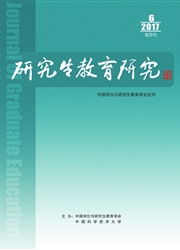

 中文摘要:
中文摘要:
探讨研究生心理韧性与情绪智力相关性。随机抽取江苏省某大学396名在校研究生作为研究对象,采用心理韧性量表和情绪智力量表进行测试,然后进行统计分析。结果表明:研三学生心理韧性均分为(3.74±0.45)分,显著高于研二学生(3.52±0.39)分(t=-3.637,P〈0.000)和研一学生(3.52±0.40)分(t=-3.239,P〈0.01);研究生的心理韧性与情绪智力(r=0.592)之间存在显著正相关的关系;自我情绪评估、情绪调节和情绪运用能较好地预测研究生的心理韧性,解释率为38.8%。研究生心理韧性处于中等偏上水平,情绪智力是影响心理韧性的重要因素。
 英文摘要:
英文摘要:
This study investigated the relationship between postgraduate students' psychological resilience and their emotional intelligence. The data from psychological resilience scales and emotional intelligence scales completed by 396 randomly-chosen students of a university in Jiangsu province were analyzed. Results show that 3rd-year students achieved an average of 3.74± 0. 45 points on resilience, significantly higher than the 3. 52 ± 0. 39 points achieved by 2nd-year students (t =- 3. 637, P〈 0. 000) and 3.52±0.40 points by first-year students (t=- 3. 239, P〈0.01). Students' psychological resilience and their emotional intelligence were significantly positively correlated (r= 0. 592). Students' evaluation of their own emotions, emotional regulation and application could well predict their psychological resilience, with an accuracy degree of 38.8%. It is concluded that postgraduate students mostly have a middle or higher level of psychological resilience and their emotional intelligence is an important factor affecting their resilience.
 同期刊论文项目
同期刊论文项目
 同项目期刊论文
同项目期刊论文
 期刊信息
期刊信息
